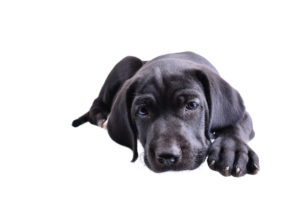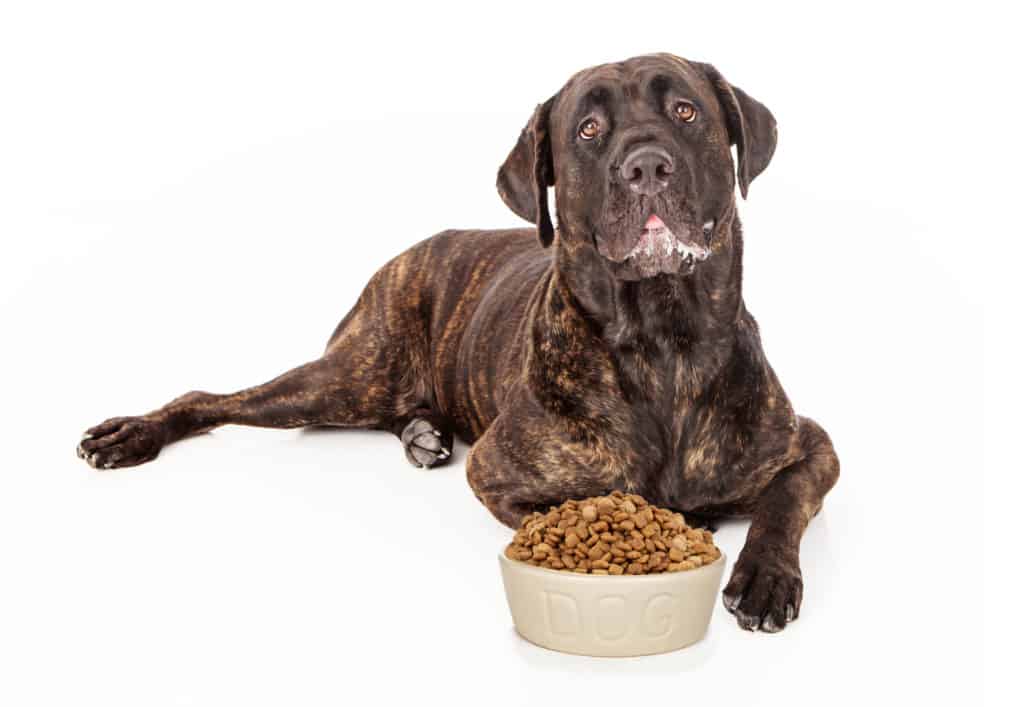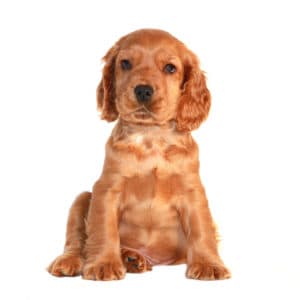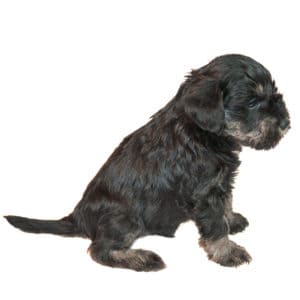 Muscular, agile, and blessed with an attractively sleek coat, the Cane Corso breed has a lot going for it. Their faithful, loving temperaments are behind the fierce bonds they form with their owners, and due to their energetic natures, they are a delight to play with. As large-breed members of the Mastiff family, Cane Corsos on the whole are vulnerable to developing joint and hip problems as they age, so the proper nutrition is essential from the start of their puppyhood. In this article, we’ll show you how to find the best dog food for Cane Corso puppies and grown-ups, and we’ll answer the key questions you probably have as an owner:
Muscular, agile, and blessed with an attractively sleek coat, the Cane Corso breed has a lot going for it. Their faithful, loving temperaments are behind the fierce bonds they form with their owners, and due to their energetic natures, they are a delight to play with. As large-breed members of the Mastiff family, Cane Corsos on the whole are vulnerable to developing joint and hip problems as they age, so the proper nutrition is essential from the start of their puppyhood. In this article, we’ll show you how to find the best dog food for Cane Corso puppies and grown-ups, and we’ll answer the key questions you probably have as an owner:
- What are the most important nutrients in a Cane Corso’s diet?
- How can I choose a dependable brand of puppy or dog food? and
- Are there certain ‘good’ or ‘bad’ ingredients I should look out for?
Quick Review: Top-3 Dog Foods For Cane Corso
Best Dog Food for Cane Corso Breed
 Large-breed dog owners There face a few key issues when shopping for a top-quality puppy or dog food. Here are two of the key problems that you need to consider, and which the best food for Cane Corsos will be designed to address.
Large-breed dog owners There face a few key issues when shopping for a top-quality puppy or dog food. Here are two of the key problems that you need to consider, and which the best food for Cane Corsos will be designed to address.
Calcium in Cane Corso Puppy Food
Due to the way that a larger dog’s skeleton is built, owners must pay careful attention to the calcium content in their food. Excess calcium during a Cane Corso’s puppyhood can increase the likelihood of his developing painful hip dysplasia, so you should always choose a recipe that is designed “for the growth of large-breed puppies”. Good Cane Corso puppy food will explicitly state that it meets this criterion on the packaging, using those precise words.
Glucosamine for Joint Support
Cane Corsos love to get active but are also sadly more prone than medium- or small-breed dogs to developing hip dysplasia. To slow down or prevent its potential development, Cane Corsos big and small need sources of glucosamine in their diet. Natural glucosamine can be found in fish, and typically any food with herring oil, salmon oil, or similar will provide a good amount of this amino sugar to promote great joint health.
Your Cane Corso Should Be Eating…
Luckily, the nutritional ins-and-outs of your large-breed Cane Corso are pretty straightforward once you’ve considered their special health concerns. They need:
- Lean animal proteins: Adult dog nutrition is about maintaining strong muscles for exercise and mobility – they require at least 18% protein to do so. Puppies are in the initial growth period of their lives and rely on food with a minimum of 25% protein to be healthy and active. Proteins can also be found in certain legumes, but animal meats are much more quickly and readily absorbed into your Cane Corso’s body.
- Natural fats: Your puppy’s body is busy fuelling that intensive growth – they need recognizable and wholesome lipids to do so. Try to ensure your puppy gets a kibble with at least 12% fat, and your adult Cane Corso will need at least 10%.
- Essential minerals and vitamins: Puppies and dogs must take in Vitamins K, A, B, D, E, and C so that their bodies can function well as a whole; there is also a range of minerals like selenium, zinc, iron, copper, and iodine that are critical for their health. Together, these all take care of your pet’s health in too many ways to count on one paw – they look after your dog’s eyes, skin, ears, blood, and metabolism, to name a few!
- Dietary fiber: A puppy or dog’s diet isn’t complete without some ‘bulk’, which helps him move that food through his gut where it can be taken in. Vegetables, traditional whole grains, and fruit are all excellent sources of the fiber that will perform this role.
How much should a Cane Corso puppy eat?
The Cane Corso puppy has a lot of growing to do, meaning they have specific dietary needs to promote this growth. Being such a large breed, it’s important to be aware of just how much you’ll need to feed your Corso pup. Let’s break it down by puppy stages:
- 2-3 months: This age range should consume between 1-2 ½ cups of food each day
- 4-5 months: This age range should consume between 2 ½ – 3 ¼ cups of food each day
- 6-8 months: This age range should consume between 3 ½ – 5 ½ cups of food each day
- 9-11 months: This age range should consume between 4 ½ – 6 cups of food each day
- 1-1.5 years: This age range should consume between 6 ½ – 9 cups of food each day
For puppies, it’s best to offer them three meals throughout the day, with two meals a day being the minimum. Puppies need multiple caloric boosts throughout the day, and due to being large dogs, it’s also known to help prevent bloat when you keep your Cane Corso from having to wait too long in between meals.
Common Cane Corso Health Requirements
With a breed this large, there are some health conditions to be aware of when it’s time to choose your Cane Corso’s diet. Their diet can impact their bodies as they grow, so there are a few ingredients to be on the lookout for when you are deciding which diet is best.
- Hip dysplasia: Hip dysplasia is an inherited condition that refers to the improper alignment of the hip joint. Dogs with hip dysplasia can have pain, limping, difficulty getting up and down, slow down with time, experience lameness, and other pain related symptoms. Since this is a condition that Cane Corso’s are prone to, it’s important to choose a diet that caters to this possibility. Try to find a food that includes omega fatty acids for joint support and lubrication, and even glucosamine as your Cane Corso reaches their adult years.
- Arthritis: Any large breed dog will likely struggle with arthritis or joint pain as they age. One of the best ways to prevent this future pain is through the protection of the joints. You can do this by focusing on diets that include omega fatty acids and other joint support minerals.
- Skin conditions: Cane Corsos are prone to allergies, dry skin, and other skin irritations that can cause distress for your canine companion. Due to this, it’s important to strengthen their skin and their immune system by offering them a diet with essential fatty acids.
- Gastric bloat (GDV): While this is not a condition that can be prevented with certain food ingredients, it is important to be aware of with large breed dogs like the Cane Corso. Bloat is a condition in which the stomach flips on itself, cutting off circulation to other organs. GDV is always fatal if left untreated, and can cause sudden death even when owners try their best to reach their vet immediately. Gastric bloat has been tied to dogs being too active after eating, or dogs going too long in between meals. Due to this, it;s best to limit their play time for the hour after their meals, and try to split their feedings into three meals each day.
Best Dog Food for Cane Corsos: Brands We Love
We don’t recommend any brand until we’ve checked out its safety record, recall history, and reputation for quality. The following are great examples of Cane Corso dog food manufacturers which have dependable facilities, overwhelmingly positive reviews from owners, and top-caliber ingredients:
- Holistic Select;
- Ziwi;
- Acana;
- Blue Freedom;
- Earthborn Holistic; and
Reviews: Best Food for Cane Corso Puppy
- Holistic Select Natural Dry Dog Food Large & Giant Breed Puppy
Pros
- Nutrient-rich lamb and chicken meals are full of protein, providing your little puppy with 25% in every bite;
- 15% fat fuels longer-lasting release of energy (perfect for active pups!);
- Promotes better physical health through antioxidants from fruit and vegetables;
- It’s naturally full of glucosamine, which comes from salmon oil; and
- That fish oil also provides your growing Cane Corso puppy with coat-enhancing Omega acids!
Cons
- Not appropriate for gluten-intolerant puppies.
- Ziwi Peak Air-Dried Dog Food
Pros
- A thoughtful combination of animal meat, bones, and organs provides your Cane Corso puppy with natural chondroitin and glucosamine, plus antioxidants for their immune system health;
- Protein-rich and air-dried, it’s preserved in one of the best possible ways for maximum nutrient absorption;
- Gives your puppy 40% protein without using any rendered animal meats or by-products;
- Potato- and grain-free, it’s a top option if your Cane Corso puppy is gluten-intolerant; and
- The top ingredients include lamb tripe, heart, and liver, all intensely nutrient-rich.
Cons
- This naturally preserved, flavored, and colored product is both grain- and filler-free, so it comes at a fairly high price.
- Acana Wild Prairie Grain Free Dry Dog Food
Pros
- This is a high-protein formula made with fresh meat, regional animal ingredients, and 35% protein for the best possible puppy health;
- 17% fat comes from recognizable, quality sources such as real poultry organs and pollock oil;
- Generous amounts of natural organs and cartilage (in ACANA’s ‘Whole Prey’ formulas!) provide chondroitin and joint-supporting glucosamine for your little puppy;
- Contains fresh, whole freshwater trout, herring, and walleye to mimic a diet that your Cane Corso’s ancestors would have eaten in the wild; and
- Uses veggies such as parsnip, kale, turnip greens, and pears for fiber instead of grains.
Cons
- Slightly pricey.
- Royal Canin Large Breed Puppy
Pros
- Omega fatty acids for optimal joint and immune health
- Naturally filled with glucosamine
- Added probiotics to help promote digestive health as they grow
- Antioxidants and minerals to help stimulate optimal immune health for growing puppies
Cons
- This diet does contain chicken and grains, meaning it may not be ideal for puppies with food allergies
Reviews: Best Food for Cane Corso Adults
- Blue Buffalo Freedom Grain Free Natural Adult Large Breed Dry Dog Food
Pros
- Gluten-free dogs can safely dig into this beef and turkey blend;
- Features a whole range of critical vitamin and mineral supplements, as well as natural sources of the same – alfalfa, kelp, parsley, barley grass, and more;
- Fish oil promotes joint mobility and gives your Cane Corso DHA;
- Omega acids in this recipe come from a variety of other natural sources, too, like canola oil and flaxseed; and
- Beef is #1 on the ingredients list, which offers a total of 22% protein and 13% fat.
Cons
- None!
- Earthborn Holistic Natural Food For Large Breed Dogs
Pros
- Provides a professionally balanced ratio of lean, muscle protein (26%) and fats (13%) for large-breed Cane Corsos;
- Contains Vitamin E supplements, along with Omega-6 fats for your adult dog’s skin;
- L-Carnitine encourages optimal transport of fatty acids and energy production (great for energetic dogs!);
- Includes DHA – a good addition for your dog’s eyes and brain; and
- The top ingredients are yummy chicken meal and fiber-rich peas!
Cons
- Sorry pups – it’s just for grown-up dogs!
- Merrick Backcountry Grain-Free Dry Dog Food
Pros
- Generous levels of chondroitin and glucosamine make this is an ideal choice for active Cane Corso adults;
- Skincare and coat health are supported by optimal levels of Omega fats from salmon;
- While it’s fortified with supplements, this Merrick formula also includes veggie and fruit vitamins;
- Contains freeze-dried, tasty ‘bits’ of poultry for greater natural flavor and nutritional value; and
- It’s manufactured here in the States.
Cons
- Some owners have reported fewer freeze-dried bits than they expected.
FAQ
What are some things I should avoid when choosing the best Cane Corso puppy food?
Nutrition is always the most important factor to consider when picking a kibble. Forget fancy packaging for a moment – if a puppy food doesn’t support your Cane Corso’s physical well-being, it’s useless. Most ‘things to avoid’ are ingredients that offer limited nutritional value, and are only used to increase the manufacturer’s profits. The two main ‘offenders’ in this regard are:
- Grain ‘fillers’ – corn and corn meals, soy and soy products, processed rice, and of course wheat, are all classic fillers. They are carbohydrate-rich ingredients that tend to boost your pup’s energy for a short while before dropping it back down again and leaving him lethargic. They also increase the weight and volume of puppy food without really helping your little one’s muscle development or growth.
- Meat by-products, rendered meats, and by-product meals – essentially, these are a quick-and-dirty way for manufacturers to boost the protein count of a food. These are waste outputs of regular meat production processes and are inferior to whole meats or ‘regular’ meat meals in terms of protein and nutrition.
Is citrus fruit bad for my Cane Corso puppy?
When it comes to citrus fruits and dogs, small amounts of citrus fruit should not be toxic to your Cane Corso. The only real risk would be feeding too much citrus to your puppy. Because it’s a source of fructose and glucose, too much of these fruits can cause your pups to experience gastrointestinal upset such as diarrhea and vomiting. If you ever feel the urge to offer your pup a small bite of citrus fruit, make sure it really is just a tiny bite!
Helpful Links
Last update on 2026-01-23 / Affiliate links / Images from Amazon Product Advertising API




